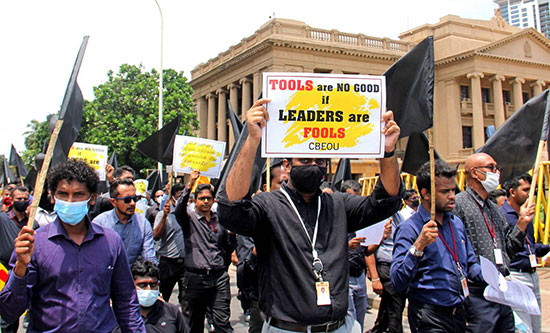We publish the below analysis of developments in Sri Lanka by Chathura Gunathilaka of the Frontline Socialist Party.
The whole world is looking at Sri Lanka and its people’s struggle today. It has been more than 100 days since hundreds of thousands took to the streets due to the economic crisis in the country. It faces scarcity of many essentials including fuel and cooking gas. People queue for miles and miles for days with just a hope that a fuel tanker will come to their fuel stations. People in cities are facing huge difficulties preparing food, especially without cooking gas. Inflation has skyrocketed and annual food price inflation alone reached 80% in June while the value of Sri Lanka’s currency has declined rapidly. Almost all small and medium-scale industries have come to a standstill. Hundreds of thousands of people are already starving and people are dying from lack of basic medicines. Public transportation is running at 10-15% capacity and schools have been closed for months due to transportation problems. The ruling class has no real plan to come out of this crisis other than waiting for some loans from monetary institutions such as the IMF, which is not a solution but part of the problem.
People continue to protest all around the country, and on 9 July, marking two months since the brutal attack on the Galle Face protesters on 9 May (see ‘Developments of the people’s struggle in Sri Lanka’), people stormed the capital in their hundreds of thousands and captured the presidential secretariat and presidential residence, ousting President Gotabhaya Rajapaksha. In the face of this resistance the president had to inform the public that he would resign on 13 July. He tried to flee the country but was rejected by the staff at airports; eventually he had to get the assistance of the air force and fled to the Maldives, then to Singapore. On 14 July his resignation was formally submitted. He remains in diplomatic limbo and could face prosecution for corruption and war crimes if he returns to Sri Lanka.
With the resignation of the president, Prime Minister Ranil Wickramasinghe became the acting-president. Wickramasinghe lost his own seat at the general election and came to the parliament with only one national seat; he became the prime minister only because he has been the long-time protector of the Rajapaksha ruling family. According to the current constitution, Parliament should elect a president within seven days if the presidency is vacated for any reason. On 20 July that election was held, and Wickramasinghe became president of Sri Lanka. On the one hand, the majority of MPs are still from the former president’s political party and on the other hand, there are rumours that tens of millions of rupees were moved to buy MPs at the election. Whatever the reason, Parliament has once again proved that it does not represent the needs of the people.
One of the first acts of Wickramasinghe’s government was to order police to demolish the protest camps. On 17 July the government declared a state of emergency, giving the police powers to detain people, search their homes and limit public gatherings. On 27 July the parliament ratified this, extending the police powers for at least a month. Two protest leaders, Kusal Sandaruwan and Weranga Pushpika, were subsequently arrested on charges of unlawful assembly, a day after student leader Dhaniz Ali was arrested at an airport. Arrest warrants have been issued for 14 individuals accused of an arson attack on Wickramasinghe’s home.
Opposition political parties see the crisis as a good opportunity to call for a general election to get into power. Some populist so-called leftist parties are also doing that rather than strengthening the people’s struggle. For the first time in Sri Lankan history, people rose together against the rulers in Sri Lanka: that unity and strength of the struggle should be protected at any cost.
During the continuous protests, people organised in protest grounds and prepared an action plan to move forward. They had prepared it under six major demands. Resignation of the former president, ministers and unlawfully appointed president Wickramasinghe are at the forefront of those demands. Providing essentials to the general public, abolishing the executive presidency, and bringing a new people’s constitution are also among the demands.
When it comes to a new people’s constitution, the demand is for it to be drafted by the people and also approved by the people in a referendum. It would include:
- that the right to life be recognised as a fundamental right;
- an appropriate process for a fair election;
- a process that provides the right to recall elected representatives;
- the right of the people to education and health;
- the right of the people to call for a referendum subject to the consent of given percentage of registered voters.
Protesters further demand that the new government should be an interim government and that it should not last for more than 12 months, with its main duty to deliver the demands of the action plan.
It is clear that this is not a socialist revolution but a spontaneous people’s struggle against the rulers. So far it has achieved a lot. It gathered masses to the streets and already ousted the prime minister with a two thirds majority in a month, reshuffled the cabinet twice and ousted the world’s most powerful president in three months. In a society that was fraught with racism, religion and other divisions for decades and especially with people dragged into mere selfishness by the neo-liberal economy, achieving such a success is not a simple thing. The left in the country is not strong enough to organise people into a revolutionary mass movement. But if the proposed action plan can be completed, it may help to strengthen the socialist revolution tomorrow. The real system change that people are expecting can only be achieved through such an organised people’s struggle.
Chathura Gunathilaka
FIGHT RACISM! FIGHT IMPERIALISM! 289 August/September 2022




